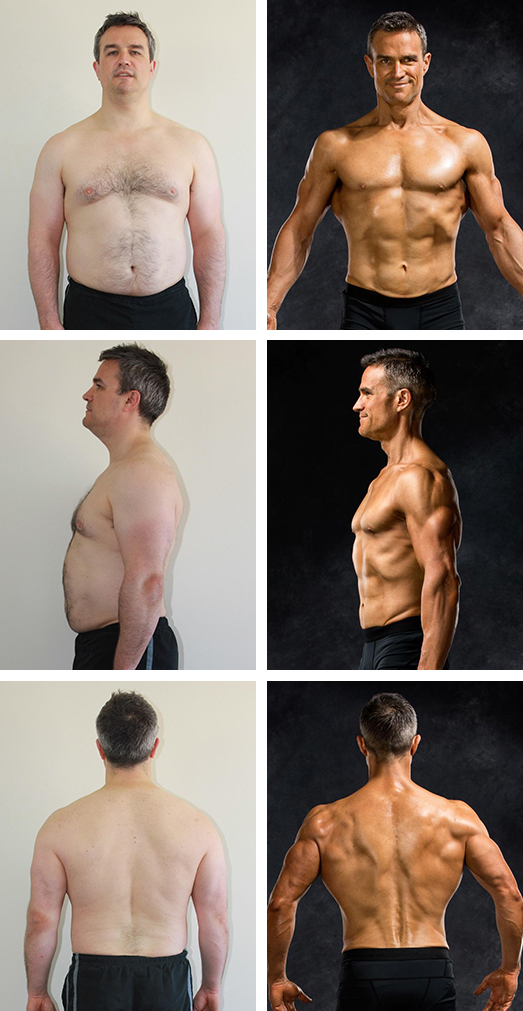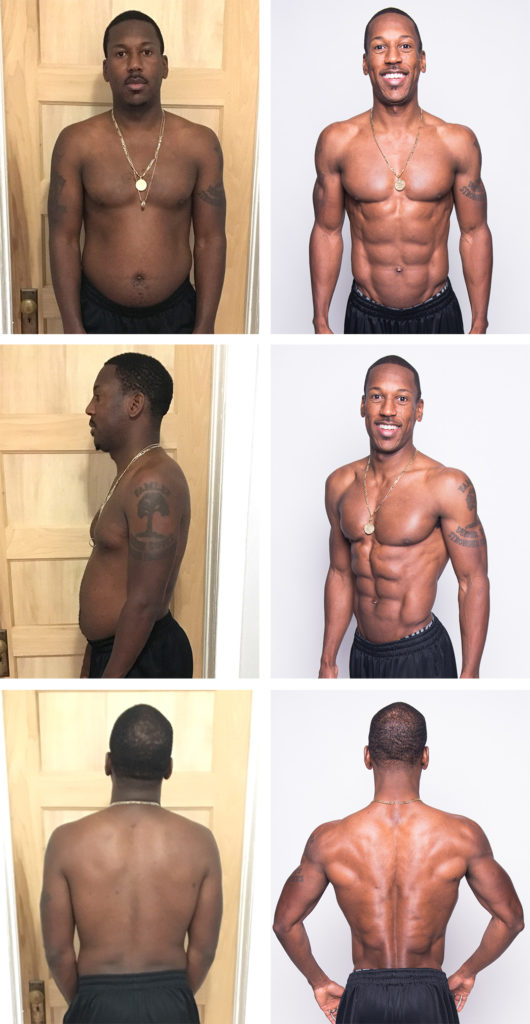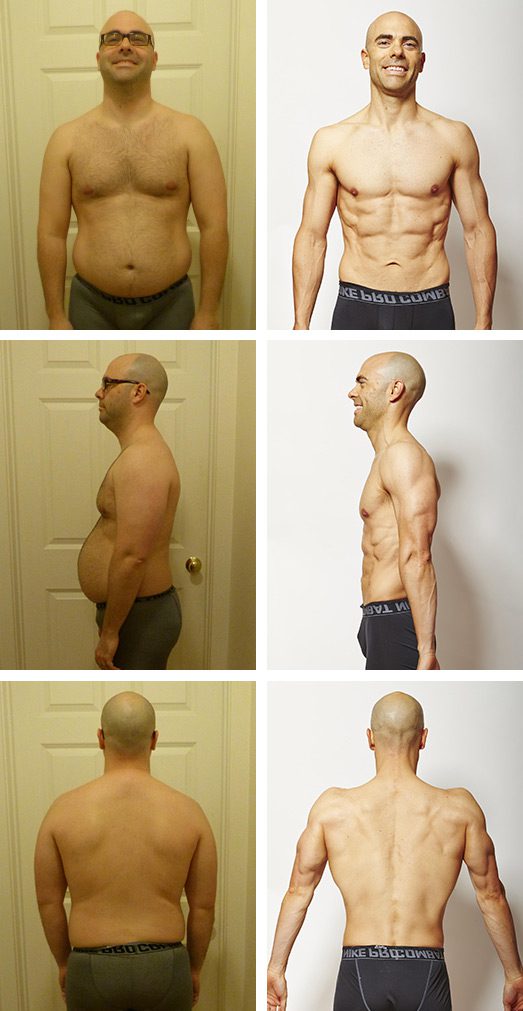By John Berardi, Ph.D.
Work stressing you out? Life in general? Having trouble staying consistent with your exercise and nutrition plan? If so, this article is for you.
Why do most guys tend to get weaker, fatter, and less healthy when they get into their 30s, 40s, and 50s? Chalk it up to increased stress, increased responsibilities, and decreased time and energy.
We know we need to eat better. We know we need to take better care of ourselves. But most guys simply have a hard time staying consistent with their nutrition and exercise plans.
After helping tens of thousands of men with Precision Nutrition Coaching, we’ve seen it all—and we know there’s a solution.
You can take control of your own health and fitness. You can reverse the downward spiral of stress, and start building a healthy body you can be proud of.
And you can do it all in an hour or two per week.
Seriously.
In this article, you’ll learn:
- the two biggest fitness-related problems that hold men back from getting and staying in shape, and
- how to overcome these obstacles to get the body — and life — you want.
Problem #1:
Your life is busier than it’s ever been.
Some interesting things start to happen as we exit our 20s and enter our 30s, 40s, and 50s:
- We tend to get less sleep and wake up tired and sore.
- Our sex hormones peak… and then start their slow decline.
- Our crackling ankles, knees, and wrists remind us that we’re getting older.
- We tend to snack and overeat more often, especially in the evenings.
- We do less binge drinking, but more consistent drinking. Polishing off a bottle of wine or drinking a few beers each night becomes an ordinary routine.
Of course it’s not all negative. Lots of positive things start happening too:
- If we’re lucky, we get a good career that’s challenging and rewarding.
- We make more money than when we were younger.
- We develop long-lasting relationships with people we love.
- We start building and nurturing a family.
- We become (presumably) smarter and more experienced.
While every guy’s life experience is different, there are a few things that remain consistent no matter who you are. For most guys, getting older usually means:
- increased responsibilities at home
- increased stress from work
- less time to take care of themselves
This is how we end up with a gym membership we rarely use, a healthy cookbook we rarely open, and a body we’re not particularly proud of.
Sure, we want to drop some fat and look more muscular and fit… but we just don’t have the time or energy. Someday, we tell ourselves, we’re finally going to get our ass in gear.
The only problem? “Someday” keeps getting postponed.
According to our research, lots of guys are so stressed out with work and family obligations, that they don’t feel like they have the time or energy to “really commit” to a nutrition or exercise plan.
But what if you didn’t have to dedicate a huge portion of your life to getting in shape?
What most guys do when they feel busy and stressed:
- Let their busy schedule overtake their health.
- Set huge fitness goals they don’t have a miracle of hitting.
- Continue to add body fat and beat themselves up for not making a change.
What you can do to be successful:
- Embrace exercise minimalism.
- Identify the biggest gap in your nutrition and work on fixing it (while ignoring everything else).
Embrace exercise minimalism.
You don’t have to spend hours in the gym to get in better shape.
That’s why in Precision Nutrition Coaching, we give our clients four workout options:
- Full workout
- At-home workout (minimal equipment)
- Quick workout (don’t have much time)
- Do your own workout
We also give them the ability to modify their workouts, with more difficult or less difficult exercises, depending on how they’re feeling that day. That way they’re always doing something rather than nothing. (Because let’s face it: the gym is the first thing to go when we get busy and stressed at work.)
So how do you embrace exercise minimalism on your own?
If you’re looking for something to try this week, here’s a plan I wrote for a good friend of mine who was struggling to find time to exercise. It’s a simple, strategic way for busy guys to get their weekly exercise in without stressing out about missing the gym.
And the whole thing takes less than an hour per week.
| Day 1 | Day 2 | Day 3 | Day 4 |
|---|---|---|---|
| 15 minutes | 6 minutes | 15 minutes | 15 minutes |
| Pushups x 10 reps | 2 minute walk | Pushups x 10 reps | Pedal 3 miles on an Airdyne / other exercise bike |
| Inverted rows x 10 reps | 15 second sprint on the treadmill at 8 mph & 10% incline | Reverse crunches x 10 reps | Maintain steady breathing through your nose |
| Kettlebell swings x 10 reps | Rest 15 seconds (straddling treadmill) | Goblet squats with dumbbell x 10 reps | |
| Rest 1 minute | Repeat 5x | Rest 1 minute | |
| Repeat 5x | 2 minute walk | Repeat 5x |
To make continual progress, it’s important to do one thing to make each workout more challenging every time you do it.
For strength workouts, this means doing additional repetitions or reducing the rest time between rounds. For the sprinting workout, this means increasing the incline, the speed, or the number of repeated sprints. And for the 3-mile bike ride you can try to do it faster than the time before, or you can go a little longer (like 3.1 miles).
It doesn’t matter what you choose, as long as you do one thing more than the last time.
Identify the biggest gap in your nutrition and work on fixing it.
According to our research, most guys we’ve polled know how important nutrition is for looking and feeling better. And they know they need to follow some sort of nutrition plan. However, they don’t know where to start. (Or they start a new diet and try to change everything at once, which usually fails).
Instead of trying to change everything about the way you eat right now—which will just add to your stress levels—we encourage you to follow the advice we give to our clients:
Once you’ve been consistent for 14-21 days, then you can pick another thing to try. The goal is to practice simple, strategic actions that build over time.
So how do you know what thing to pick? Easy. Just ask yourself this question:
“What’s the one thing I could do right now to feel better about my nutrition?”
Chances are you have a good idea on what you need to do. Here’s a short list of what some of our clients have focused on:
Goal: Drink less beer.
Action: Instead of drinking two beers every night, have one beer.
Goal: Eat less junk food / fast food.
Action: Instead of stopping in for a burger or taco for lunch, go to a grocery store and get a pre-made salad with chicken on it.
Goal: Reduce carbohydrates.
Action: Instead of ordering fries at dinner, get a salad. Instead of having a breakfast sandwich, order scrambled eggs.
The idea here is to pick the one nutrition practice that will make the biggest impact on your body and health right now.
If you need help deciding what that is—or if you just want to follow a proven nutrition plan—well, that’s what we do best. A good first step would be to learn more about Precision Nutrition Coaching.
Problem #2:
You know what to do… but you’re just not consistent.
This is the motherlode of all problems. According to our research, roughly 65 percent of guys (and likely a lot more) report that they struggle with staying consistent.
And it’s not like they’re complete exercise beginners. Here’s what most guys have tried before getting results with us:
- P90X, Insanity, and other workout DVDs
- CrossFit and other group workouts
- Fitbit, Apple Watch and other wearable fitness technology
- Popular diets like intermittent fasting, paleo, and low-carb
- Workout books and magazine articles
Of course, these aren’t “bad” options. They end up working for some people. But eventually most of these methods and tools begin to break down and fail over time.
Why is that?
It’s because they’re surface solutions. They help solve a surface-level problem.
- Don’t have a gym to train at? Now you do.
- Want to track how many calories you eat? Here’s an app.
- Want to know how many steps you’re taking? Wear this bracelet thing.
The only problem with surface-level solutions? They only work for a little while.
They don’t account for the ups and downs of everyday life. They don’t adapt to your life. And because of that, they don’t help you stay consistent.
What most guys do when they fail to be consistent.
- Pick another surface solution to follow.
What you can do to be successful:
- Make yourself accountable to a program.
- Make yourself accountable to a person.
Make yourself accountable to a program.
Ideally, you want a program that covers a few bases:
- It’s been tested with lots of people (so you know it actually works).
- It’s customizable to your lifestyle (so you can stay consistent and do it even when you’re busy).
- It’s something you actually enjoy doing (who’s going to exercise if it’s not fun?).
- There’s something big and positive to shoot for (a pot of gold at the end of the rainbow).
The first three are incredibly important; they’re the cornerstone of a solid exercise and nutrition program. But the fourth one—having something big and positive to shoot for—is often overlooked.
In fact, most programs do the opposite: They make you feel guilty and bad for “slacking” or for not being a paragon of health and fitness. But we don’t need any more negativity in our lives, and we’re sure you don’t either.
That’s why we give away $250,000 every year in Precision Nutrition Coaching. It’s just something extra to push for, something to look forward to, something to inspire a little internal competition.

So how do you know if a certain program will help keep you accountable?
After 15+ years in the fitness industry, we’ve determined that the following four things are of the utmost importance:
- You need a way to measure your progress and track it on a daily, weekly, and monthly basis.
- You need to follow a structured plan, but still have room to move at your own speed when needed.
- You need a daily reminder to practice whichever nutrition, exercise, or lifestyle habit you’re currently working on.
- You need it to be customizable to your skill levels, goals, and how much time you have available.
That’s what helped our clients achieve results like this:
Make yourself accountable to a person.
This tip isn’t for everyone but it can often make the difference between consistently getting great results or falling off the wagon.
Personal accountability is more important than personal motivation for one simple reason: No one always feels motivated to go to the gym or make healthy eating choices.
But if we have someone who’s checking up on us to see how things are going, we’ll likely do better because a) we don’t want to disappoint the person who’s helping us and b) we don’t want to look or feel lazy.
If we’re accountable to another person, we’ll actually do the workouts and eat the food we need to look and feel great. And we’ll do it over and over again, even when the going gets tough.
That’s why the most successful guys become accountable to another person. It could be a friend or workout partner. It could be your spouse. It could be a local personal trainer or fitness expert.





